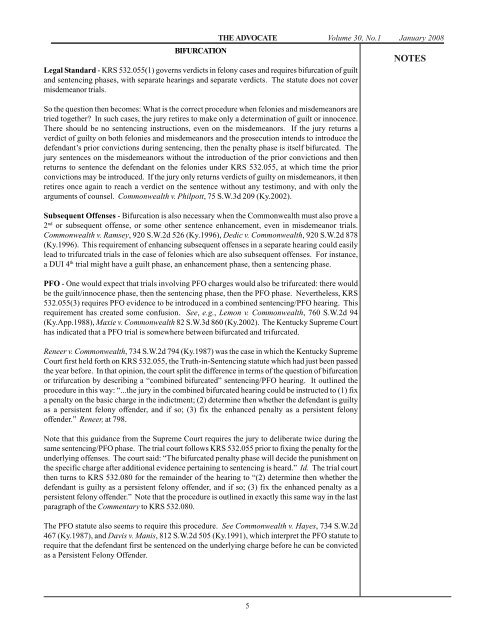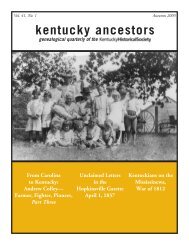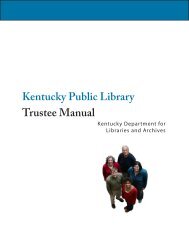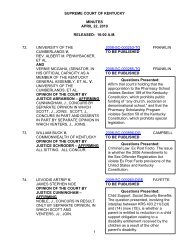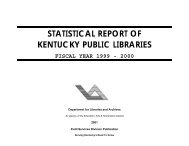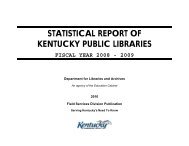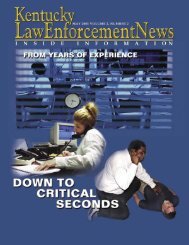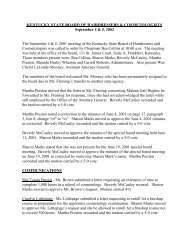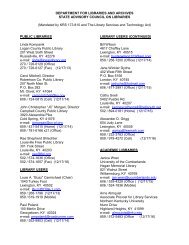Jan08 Advo.pmd - e-archives Home
Jan08 Advo.pmd - e-archives Home
Jan08 Advo.pmd - e-archives Home
Create successful ePaper yourself
Turn your PDF publications into a flip-book with our unique Google optimized e-Paper software.
BIFURCATION<br />
THE ADVOCATE Volume 30, No.1 January 2008<br />
Legal Standard - KRS 532.055(1) governs verdicts in felony cases and requires bifurcation of guilt<br />
and sentencing phases, with separate hearings and separate verdicts. The statute does not cover<br />
misdemeanor trials.<br />
So the question then becomes: What is the correct procedure when felonies and misdemeanors are<br />
tried together? In such cases, the jury retires to make only a determination of guilt or innocence.<br />
There should be no sentencing instructions, even on the misdemeanors. If the jury returns a<br />
verdict of guilty on both felonies and misdemeanors and the prosecution intends to introduce the<br />
defendant’s prior convictions during sentencing, then the penalty phase is itself bifurcated. The<br />
jury sentences on the misdemeanors without the introduction of the prior convictions and then<br />
returns to sentence the defendant on the felonies under KRS 532.055, at which time the prior<br />
convictions may be introduced. If the jury only returns verdicts of guilty on misdemeanors, it then<br />
retires once again to reach a verdict on the sentence without any testimony, and with only the<br />
arguments of counsel. Commonwealth v. Philpott, 75 S.W.3d 209 (Ky.2002).<br />
Subsequent Offenses - Bifurcation is also necessary when the Commonwealth must also prove a<br />
2 nd or subsequent offense, or some other sentence enhancement, even in misdemeanor trials.<br />
Commonwealth v. Ramsey, 920 S.W.2d 526 (Ky.1996), Dedic v. Commonwealth, 920 S.W.2d 878<br />
(Ky.1996). This requirement of enhancing subsequent offenses in a separate hearing could easily<br />
lead to trifurcated trials in the case of felonies which are also subsequent offenses. For instance,<br />
a DUI 4 th trial might have a guilt phase, an enhancement phase, then a sentencing phase.<br />
PFO - One would expect that trials involving PFO charges would also be trifurcated: there would<br />
be the guilt/innocence phase, then the sentencing phase, then the PFO phase. Nevertheless, KRS<br />
532.055(3) requires PFO evidence to be introduced in a combined sentencing/PFO hearing. This<br />
requirement has created some confusion. See, e.g., Lemon v. Commonwealth, 760 S.W.2d 94<br />
(Ky.App.1988), Maxie v. Commonwealth 82 S.W.3d 860 (Ky.2002). The Kentucky Supreme Court<br />
has indicated that a PFO trial is somewhere between bifurcated and trifurcated.<br />
Reneer v. Commonwealth, 734 S.W.2d 794 (Ky.1987) was the case in which the Kentucky Supreme<br />
Court first held forth on KRS 532.055, the Truth-in-Sentencing statute which had just been passed<br />
the year before. In that opinion, the court split the difference in terms of the question of bifurcation<br />
or trifurcation by describing a “combined bifurcated” sentencing/PFO hearing. It outlined the<br />
procedure in this way: “...the jury in the combined bifurcated hearing could be instructed to (1) fix<br />
a penalty on the basic charge in the indictment; (2) determine then whether the defendant is guilty<br />
as a persistent felony offender, and if so; (3) fix the enhanced penalty as a persistent felony<br />
offender.” Reneer, at 798.<br />
Note that this guidance from the Supreme Court requires the jury to deliberate twice during the<br />
same sentencing/PFO phase. The trial court follows KRS 532.055 prior to fixing the penalty for the<br />
underlying offenses. The court said: “The bifurcated penalty phase will decide the punishment on<br />
the specific charge after additional evidence pertaining to sentencing is heard.” Id. The trial court<br />
then turns to KRS 532.080 for the remainder of the hearing to “(2) determine then whether the<br />
defendant is guilty as a persistent felony offender, and if so; (3) fix the enhanced penalty as a<br />
persistent felony offender.” Note that the procedure is outlined in exactly this same way in the last<br />
paragraph of the Commentary to KRS 532.080.<br />
The PFO statute also seems to require this procedure. See Commonwealth v. Hayes, 734 S.W.2d<br />
467 (Ky.1987), and Davis v. Manis, 812 S.W.2d 505 (Ky.1991), which interpret the PFO statute to<br />
require that the defendant first be sentenced on the underlying charge before he can be convicted<br />
as a Persistent Felony Offender.<br />
5<br />
NOTES


